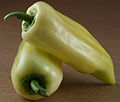Bhaji
 Stuffed mirchi (chilli) bajji served in an Indian restaurant | |
| Alternative names | Bhaji, bajji, onion bhaji, bhajia (Gujarati) |
|---|---|
| Type | Fritter |
| Place of origin | India, Pakistan, Nepal and Bangladesh |
| Region or state | Indian subcontinent |
| Serving temperature | hot |
| Main ingredients | Gram flour, vegetables |
| Similar dishes | Pakora and other fritters made from wheat or corn flour |
A bhaji or bajji is a type of fritter originating in the Indian subcontinent. It is made from spicy hot vegetables, commonly onion, and has several variants.[1] It is a popular snack food in India and is also very popular in Pakistan. It can be found for sale in street-side stalls, especially in tapris (on streets) and dhabas (on highways). It is also a common starter or side dish in Anglo-Indian cuisine across the United Kingdom.
The Guinness World Record for the largest onion bhaji is held by one weighing 175.48 kilograms (386 lb 13+3⁄4 oz) made by Oli Khan and Team of Surma Takeaway Stevenage on 4 February 2020.[2]
Regional varieties
[edit]Outside Southern and Western India, such preparations are often known as pakora. Its variations include the chili bajji, potato bajji, onion bajji, plantain bajji and the bread bajji (or bread pakora). Another version is called bonda (in south India), vada (in Maharashtra) and gota (in Gujarat). Bonda has potato or mixed-vegetable filling while gota is made with green fenugreek leaves.
Cultural significance
[edit]Bhajis are a component of traditional Punjabi Pakistani and Gujarati, Marathi, Tamil, Kannada and Telugu cuisines served on special occasions and at festivals. They are generally served with a cup of coffee, tea, or a traditional serving of yameen. Banana peppers are used for making mirchi bhajji.
Onion bhajis are often eaten as a starter in Anglo-Indian restaurants before the main course, along with poppadoms and other Indian snacks. They may be served with a side of salad and a slice of lemon, or with mango chutney, and are traditionally made to a mild taste.[1]
Gallery
[edit]-
Banana pepper used in mirchi bhaji
-
A close-up of bajji
-
Preparation of bajjis in South India
-
A variant: aloo bajji
-
Onion bajji
-
Kanda bhaji
References
[edit]- ^ a b Cloake, Felicity (13 November 2013). "How to make the perfect onion bhajis". The Guardian. Retrieved 26 November 2018.
- ^ "Largest onion bhaji". Guinness World Records. Guinness World Records. Retrieved 11 March 2021.
External links
[edit] Media related to Bhaji at Wikimedia Commons
Media related to Bhaji at Wikimedia Commons







